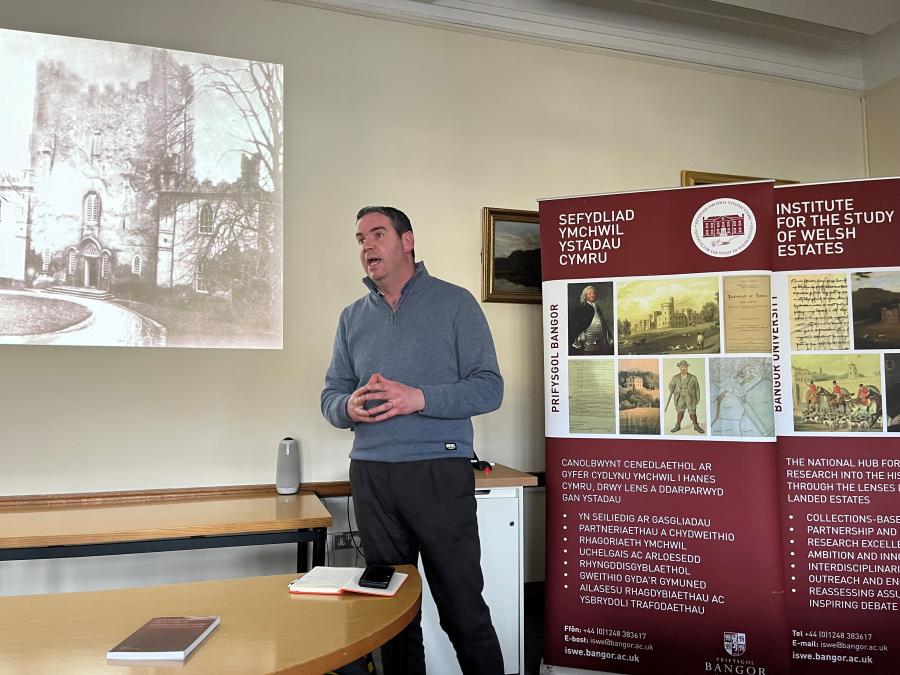Bangor Lecture Examines Irish Famine Questions
It was with great pleasure that the Institute for the Study of Welsh Estates (ISWE), in partnership with the School of History, Law and Social Sciences, welcomed Dr Ciarán Reilly back to Bangor University on 15th April to share his seminal research on ‘Irish Landed Estates and the Great Irish Famine, 1845-1852’.

Ciarán is Assistant Director of the Centre for the Study of Historic Irish Houses & Estates (CSHIHE) at Maynooth University, and one of ISWE’s oldest friends, having collaborated on several projects and initiatives, including recent research on the role of the land agent and connections between Irish and Welsh estates.
Together with Professor Terence Dooley of CSHIHE, Ciarán’s invaluable advice, encouragement and support has played a significant role in the establishment of ISWE over the last decade, so it was wonderful to see such a large turnout and enthusiastic engagement with what was a fascinating and thought-provoking guest lecture.
Throughout his academic career, Dr Reilly has written extensively on both the history of the Irish Country House – The Irish Land Agent: The Case of King's County, 1830-60 (2014) – and the Great Irish Famine – John Plunket Joly and the Great Famine in King’s County (2012). For his latest research, he has directly combined these two areas of expertise, to assess the varying attitudes of Irish landlords to the catastrophic potato blight that struck the country during the mid-nineteenth century, and their reactions to the economic and social devastation that was wrought upon their tenants.
Citing several interesting case studies, and thanks to close engagement with estate archives, Dr Reilly was able to outline the centrality of landed estates to understanding the most tumultuous period of modern Irish history. The research interrogates some of the central narratives constructed around the role of Irish landowners during in the tragedy, insisting that there was no ‘typical response’ from these landlords – some acted with benevolence, others were apathetic, many evicted tenants from their land.
Dr Reilly focuses closely on the controversial issue of evictions during the Famine. He challenges the conventional depiction of landowners as despotic Anglo-Irish ‘Earls, Lords and Sirs’, drawing attention to the culpability of a wider cast of ‘Famine actors’, such as middlemen, strong farmers and small farmers, and interestingly the Irish clergy, in this infamous period of land dislocation and disinheritance, which effectively led to the eradication of the cottier class in Ireland. Dr Reilly demonstrates convincingly that ‘evictors’ came in all shapes, sizes – and interestingly, religious persuasions – and indeed featured some of Ireland’s most celebrated public institutions. Despite its centrality to Irish consciousness, this subject has never been fully researched by academics. The careful, multidimensional and evidence-based questioning and reinterpretation of the Famine presents a significant challenge to conventional understandings of Irish history and nationhood.
The Director of ISWE, Dr Shaun Evans, thanked Ciarán for his talk, pointing to the depth of insight derived from critical exploration of estate archives. Ciarán’s research is making really important connections between the country house, landed estate, and themes and issues of immense socio-economic significance – in this instance, a devastating humanitarian catastrophe that had a lasting impact on all aspects of life in Ireland. Ciarán’s careful and critical analysis of this difficult historical subject is to be applauded.
While Ciarán is only partly through the research, judging from the feedback and response of the audience, which featured many members with Irish ancestors, this work promises to make a vital contribution to the study of both Irish estates and the Famine. Shaun and the entire ISWE team thanked him wholeheartedly for taking the time to come to Bangor to share his ideas and thoughts with us, and for providing such a stirring and innovative examination of what remains the most controversial event in Irish history. We look forward to hearing more about his findings, in the hope that he will return to Bangor to share them with us very soon!
Go raibh maith agat, Ciarán!
(Authored by Sean Martin)
